CREDS Transport & Mobility Theme Lead, Jillian Anable, gave the plenary keynote closing presentation at last week’s 51st Annual Universities’ Transport Study Group Conference.
CREDS Transport & Mobility Theme Lead, Jillian Anable, gave the plenary keynote closing presentation at last week’s 51st Annual Universities’ Transport Study Group Conference.
Jillian’s presentation was called Rearranging elephants on the Titanic: the astonishing absence of the carbon reduction imperative in transport policy and research.
Abstract (submitted February 2019)
This paper presents a stark and unflinching analysis of the questions confronting the transport scientific community in the face of catastrophic climate change. The Paris Agreement to pursue efforts to limit the global temperature increase to 1.5°C requires a profoundly more challenging mitigation agenda than the UK Committee on Climate Change, and indeed most of the academic community, has countenanced to date. Given its failure to achieve any net reductions in carbon since 1990 (against a 45% decrease for the whole UK economy), the sector now has only 11 years in which to achieve 40 years’ worth of carbon reductions.
When the post-Paris context is considered in whole-system transport and energy models, the scale of change implied for the transport sector appears inconceivable. Various studies are beginning to tell a consistent story: this urgency translates into a massive reduction of at least 15% in car distance by 2030 even when pushing hard on the introduction of alternative technologies, and up to 60% reduction if the slow pace of electrification and absence of sustainable solutions for heavy goods vehicles and aviation prevails.
Why is it that we – including transport academics – have so continuously and fundamentally failed over carbon mitigation? Climate change remains a peripheral issue within core transport research and teaching efforts and academics have not yet catalysed a meaningful mitigation agenda. Where does the balance of responsibility lie between wilful delusion versus well-intentioned political pragmatism? As we face losing our integrity over this issue, how can we embed hard-hitting debate and fresh perspectives that focus on radical as opposed to incremental change? And have we left it all too late?
Please note: this is the script of the presentation with slides inserted. Citations in the text relating to some specific facts and figures are not as thorough as they would be in an academic published paper! However, this script can be cited using the details:
Rearranging elephants on the Titanic: The astonishing absence of the carbon reduction imperative in transport policy & research. Plenary Keynote presentation given at 51st Annual University Transport Studies Group conference, Leeds, 10 July 2019. Jillian Anable, Professor of Transport and Energy, Institute for Transport Studies, University of Leeds.
1. Introduction
I am not sure how many of you will have had a chance to read my abstract submitted for this talk. I read it, as you do, to remind yourself just how much you might have over-promised! It starts of course with the title:
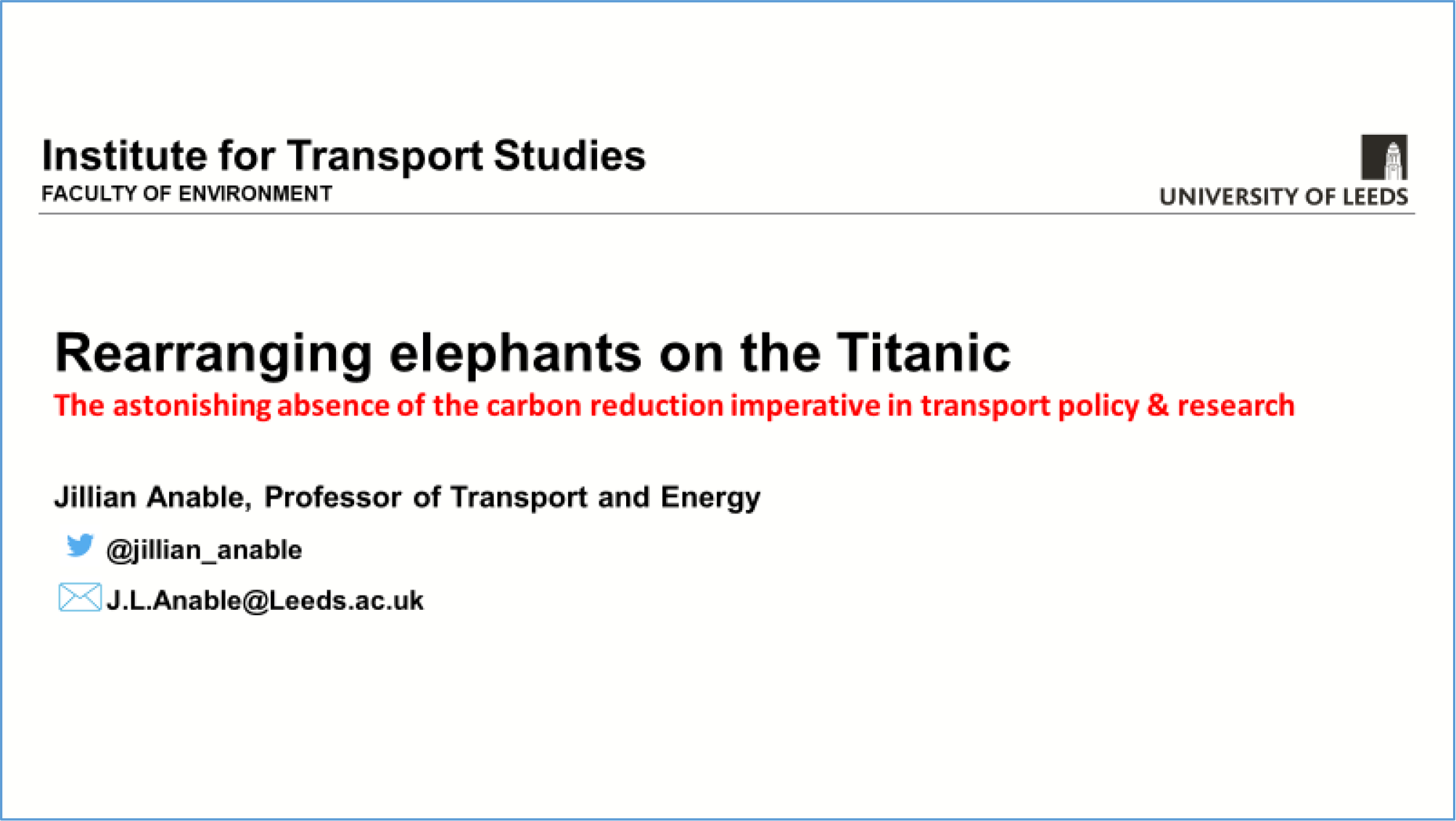
I have to admit to being quite happy with that. In fact, I checked on Google that I had really made it up! And I can’t help but think I ought to quit right here while I am ahead – it pretty much says it all anyway… and you may soon really wish that I had stopped there!
The inference, of course, is that the climate crisis is looming all around us now, which indeed it has been for over three decades – AS IT IS NOT A NEW PROBLEM.
Yet rarely to do we see in this community any research which takes as its focus the root causes and consequences of climate change, and the systemic barriers to mitigation. This is so astonishing given that transport plays such a huge and stubborn role in this crisis. This sector is still 98% dependent on fossil fuels. Yes, 98% in 2019.
In research terms, there are lots of add-on calculations of carbon reductions saved; lots of use of existing models with emissions factors applied. Meanwhile, we are letting more and more water on board our Titanic while our implements to bale ourselves out are getting increasingly ineffectual in designing ways of managing our way out of this crisis – very rapidly, very deeply and, no doubt, very unevenly.
2. The central question
Therefore, the main question at the centre of this paper is:
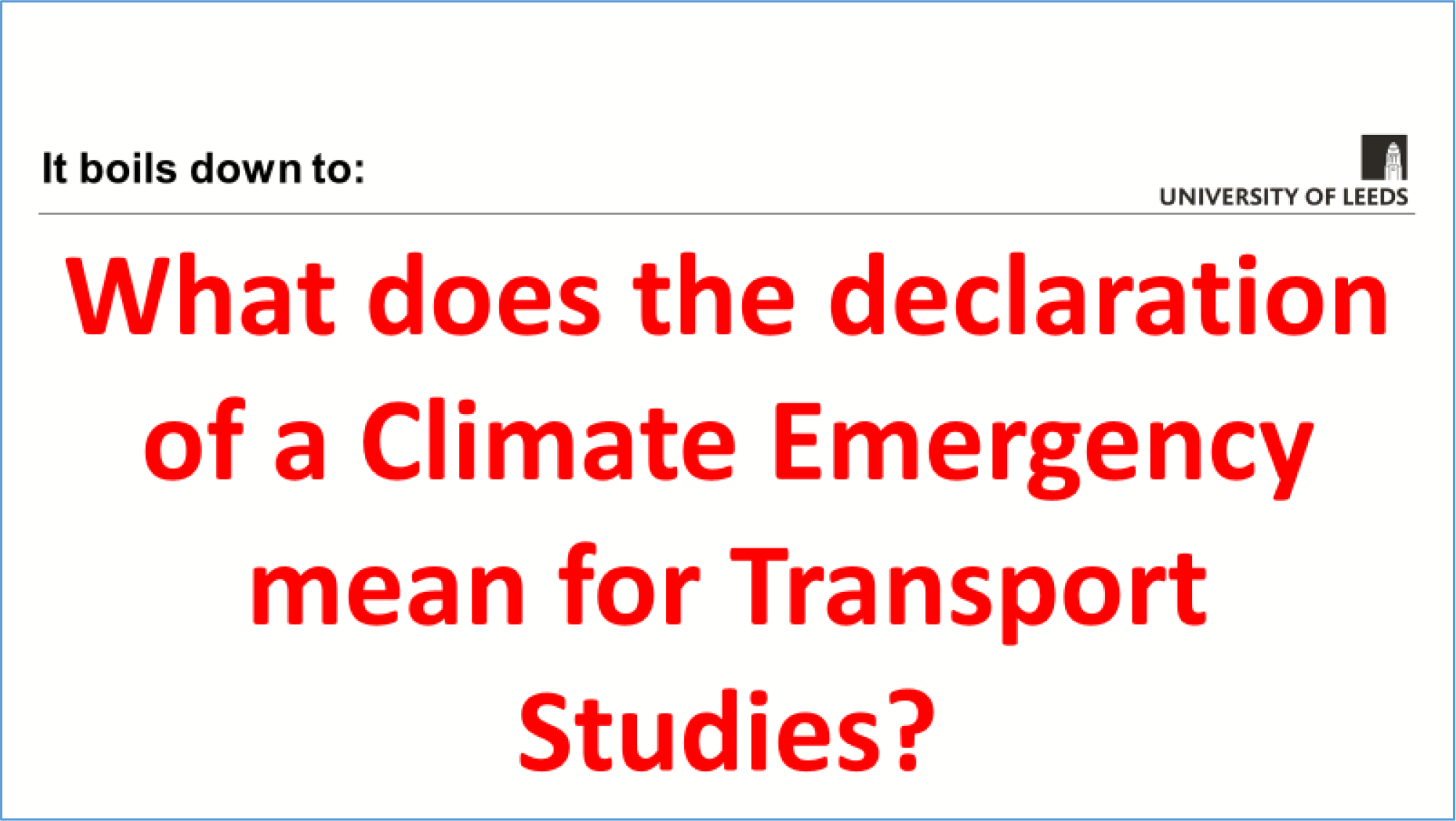
So I read the abstract and reminded myself that I said:
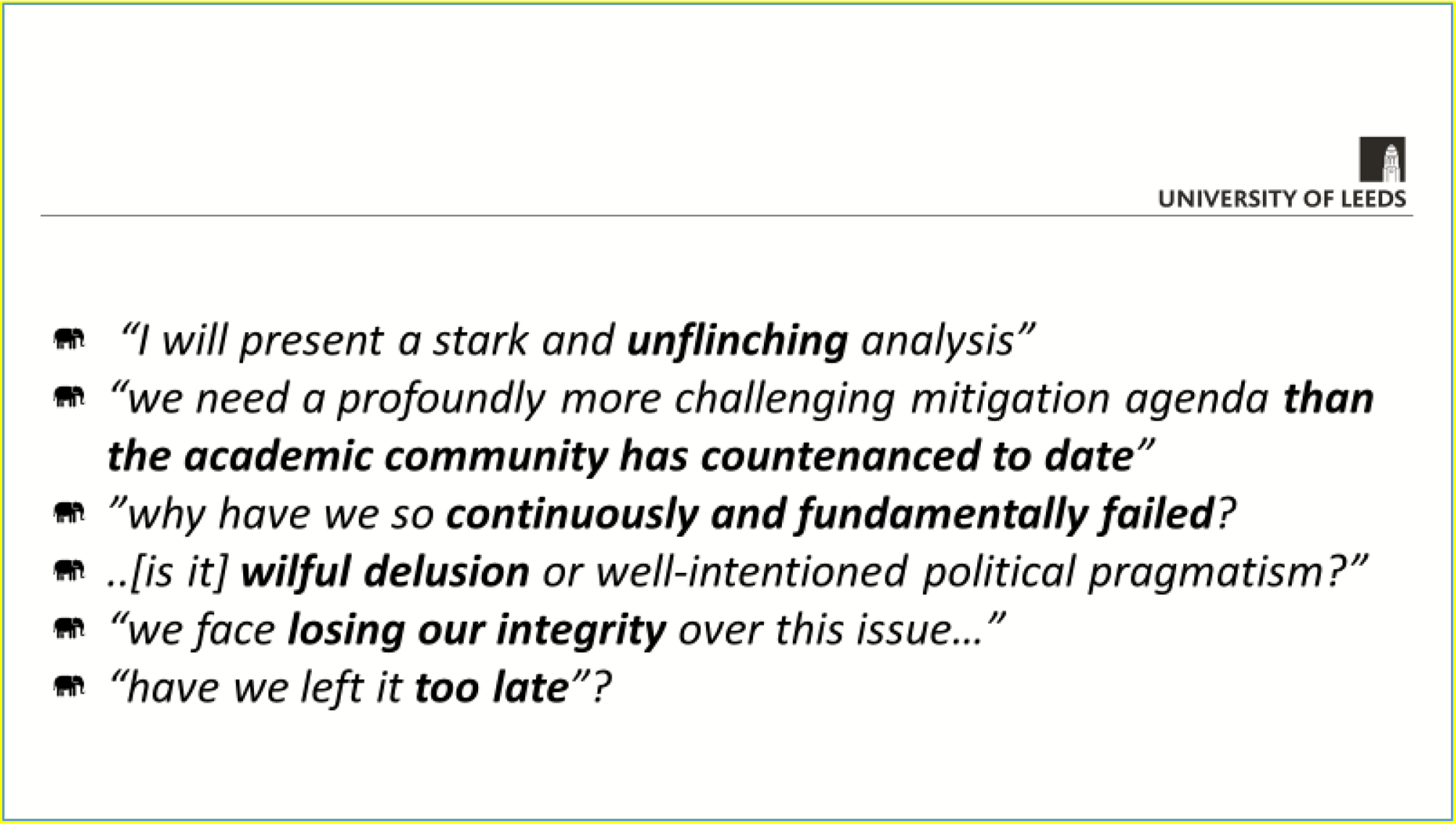
And I looked at and thought: ‘gosh, I was actually in quite a GOOD mood when I wrote that!!!’ Because I managed not to mention that everything we are doing is pointless at best, or, that we are possibly doing more harm than we are good. I didn’t mention that I am considering packing all this in to go and plant some of those millions of trees that the Committee on Climate Change offered as one of its more concrete and feasible solutions to achieving Net Zero.
By the way, for those of you undertaking research on the UK context and you don’t know what I mean when I refer to the CCC’s net zero report, or haven’t read it yet, YOU are the people to whom this talk is especially aimed.
But, be warned, I was not in such jolly spirits when I was preparing for this talk. Some of this might be because Extinction Rebellion, the phenomena that is Greta Thunberg, as well as the publication of even more scientific evidence the ecological as well as the climate crisis, including the declaration in the UK Parliament of an emergency, have all happened since I wrote the abstract in February.
Elephants are now everywhere I look. And, I have to say, some of my mood right at this moment is the result of having been among all these amazing people for two days but feeling like I am one of the only ones hearing the Elephants roar.
If there is one thing we know for sure, it is that change is inevitable. The Climate Crisis is so big, it means that everything will change. We are not immune to that change. I would love to stop here and ask what each of you thinks they can or will change in terms of the research they are doing or plan to do. But, I have decided to plough on and hope that this talk will start a discussion beyond this session.
3. Pre-Traumatic Stress Disorder
I do, though, need to start by sharing a piece of personal information. You should know that I am suffering from a serious, potentially career limiting condition… It is called Pre-Traumatic Stress Disorder.
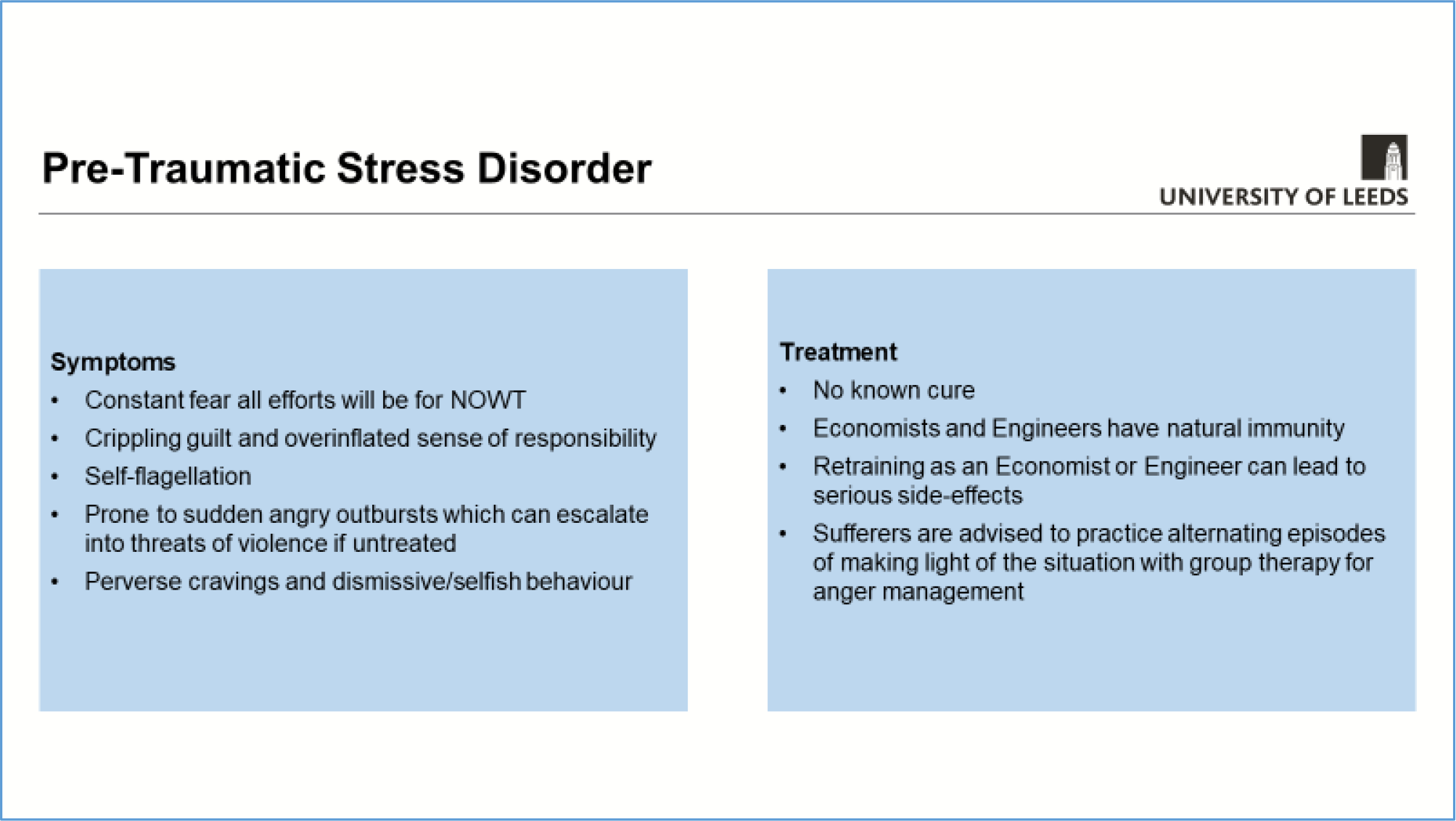
The symptoms are similar to post-traumatic stress disorder but in this case, they stem from anticipatory anxiety about events that may occur. And just like other mental health conditions, this one is more prevalent than we acknowledge among even our nearest and dearest. We need to talk about it much more. Let’s familiarise ourselves with the symptoms… and the treatment.
Well, I have done the making light of the situation. So welcome, everyone, to Group Therapy. Today it is my time to share my hopes and fears while you to join me in reflection, challenge and self-enlightenment.
4. Admitting abject failure
It is fascinating how the three keynotes for this conference have worked out. At the risk of oversimplifying:
- From Steve Melia we had a retrospective analysis of how the economic, social and political weather shaped the birth, death and rebirth of a specific policy area over time;
- From Phil Goodwin we had reflections across multiple policy areas (and decades!) on how his research has influenced the policy discussion with particular advice around predicting the policy weather
- I want to talk about how research could be done – not so much how it might be correctly communicated and used to inform policy, but how to inform the right policies. Controversially. I essentially want to write the policy impact before I do the research – for which I have coined the term “research backcasting”.
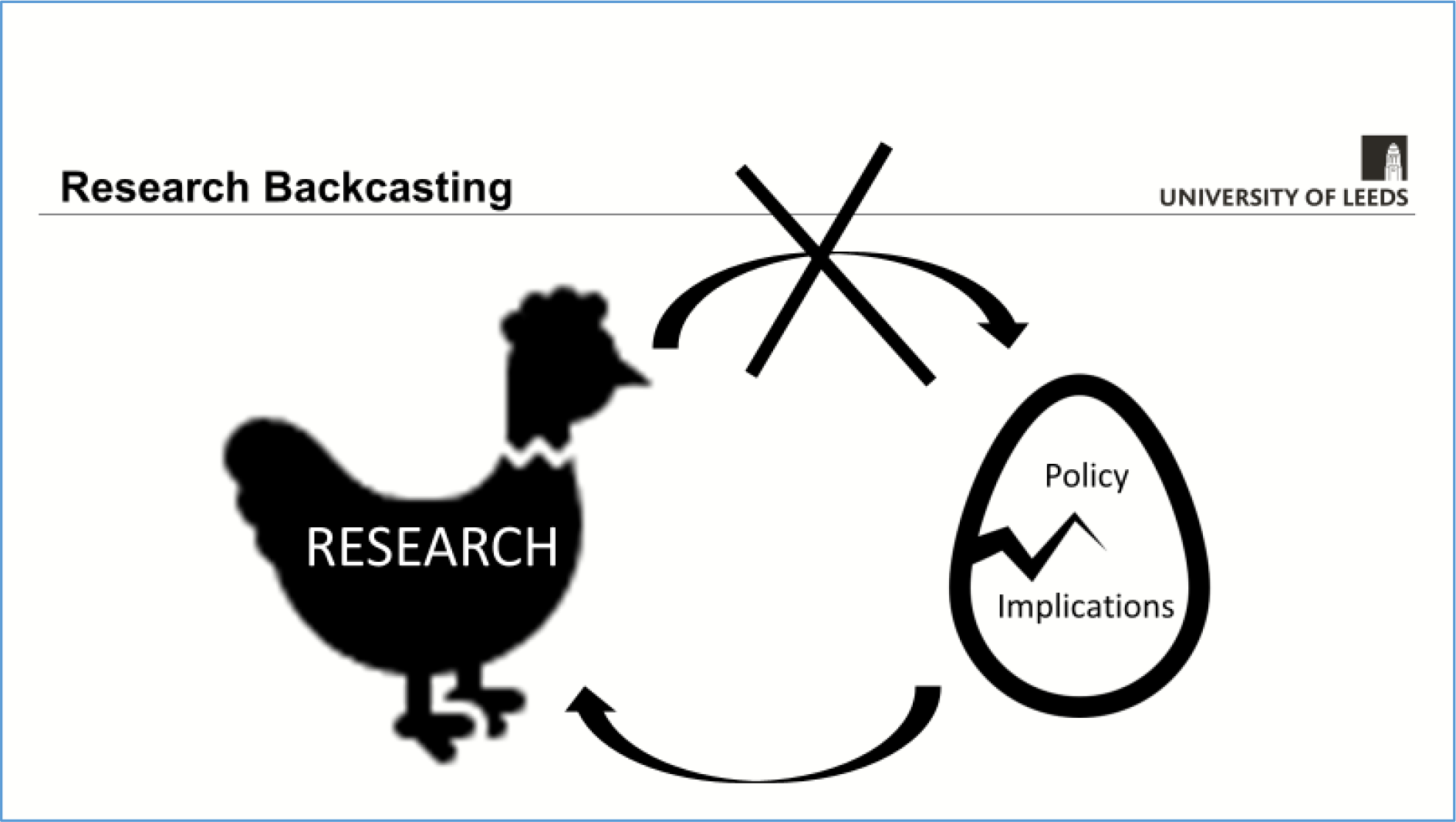
Maybe you were expecting something different. Maybe you were expecting lots of graphs like these:
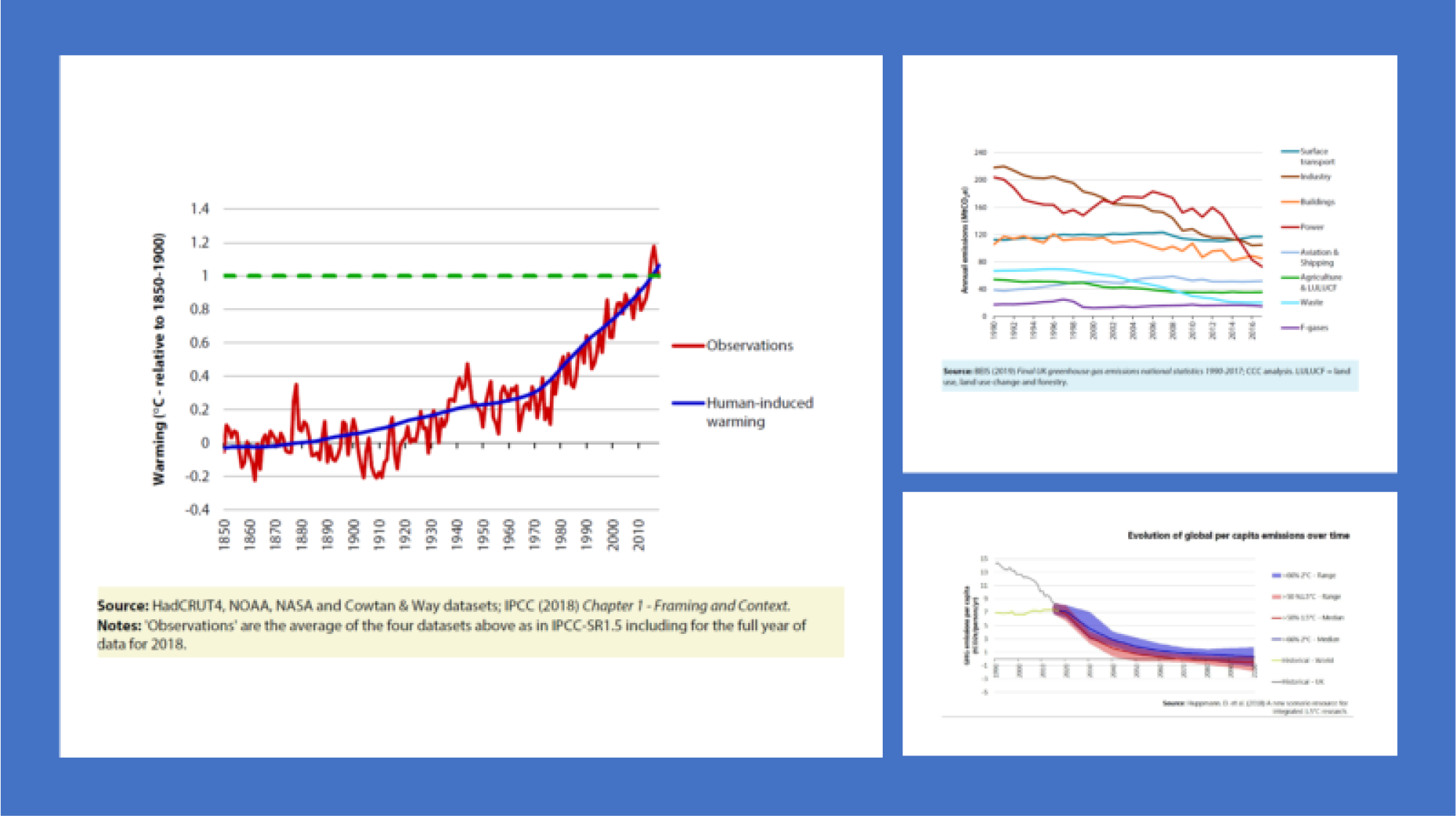
Well, you are not getting those! I will sum it up instead by giving you this slide and asking you how successful you are feeling:
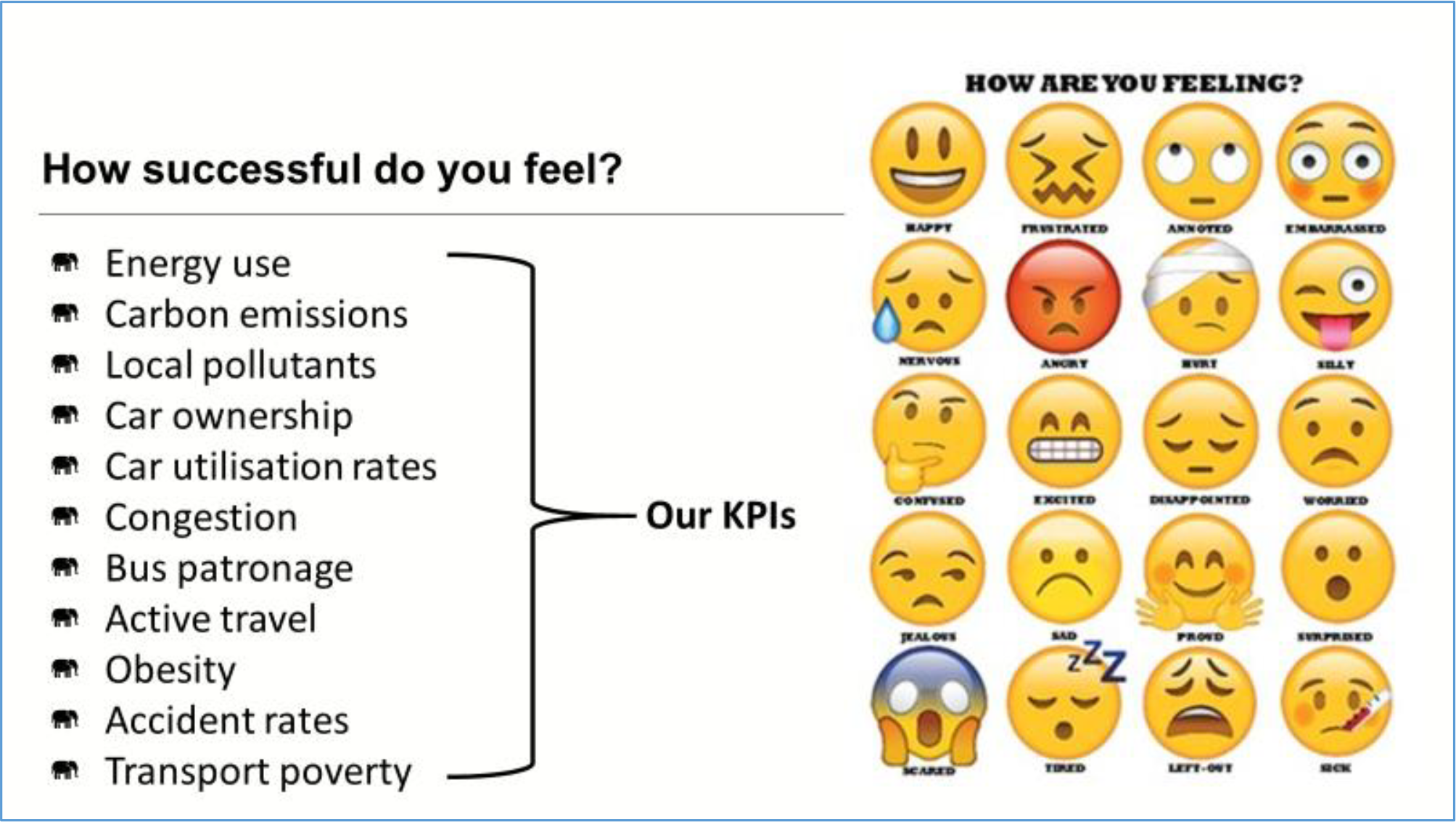
I won’t take you through all of these. But let’s remind ourselves of the climate related ones:
- energy use from the transport sector in the UK is 40% of final energy demand and 16% since 1990, against a UK economy-wide decrease of 4%. And did I mention it is 98% dependent on fossil fuels) …
- Carbon emissions (grown as a share of overall carbon emissions with no net reduction between 1990-2017 (vis-à-vis –43% for all sectors
So, I don’t feel successful. Because ultimately, I have been living in my comfort zone. And I say this despite the fact that I have been one of very few transport academics to have worked very closely with the energy studies community now for over 15 years; advised bodies such as CfiT, Scottish Government, Committee on Climate Change, US Dept of Energy, currently the Government’s Electric Vehicles and Energy Taskforce making myself unpopular everywhere I go from my pessimistic (but proven correct) projections of slow EV uptake. In other words, on the face of it I have ‘done my bit’. But the reality is, I am late to the table in comparison to so many inspirational thinkers, though, sadly, I have to say, not many directly in the transport sphere.
I, alongside senior colleagues in this room, have collectively and demonstrably failed to catalyse a meaningful carbon mitigating agenda. We cannot duck responsibility. And therefore, we have, in my view, no choice but to admit that fresh perspectives and radical changes in research design are sorely needed.
5. A manifesto for transport studies research in a climate emergency
At the minimum, this means tirelessly exposing the gap between current measures and what needs to happen. But, there are many other elements of our approaches and practices that also need to change. So, I will now present to you my 6-point manifesto for transport studies in a climate emergency.
This amounts to a first draft manifesto of the principles I believe transport studies research has to adopt to maintain its integrity. That is, to prioritise research which can catalyse further and faster reductions in carbon emissions than we have ever before countenanced over a time horizon we generally consider inconceivable for systemic change. In addition, the solutions we work on should prioritise human well-being within planetary boundaries requiring adherence to principles of deep democracy, equitable distribution and environmental justice.
Now I have set out these 6 what I am calling ‘pledges’ or principles that might be agreed upon as being necessary to face this challenge credibly as community. They are draft. I got stuck. I drew inspiration from the sources on this slide:
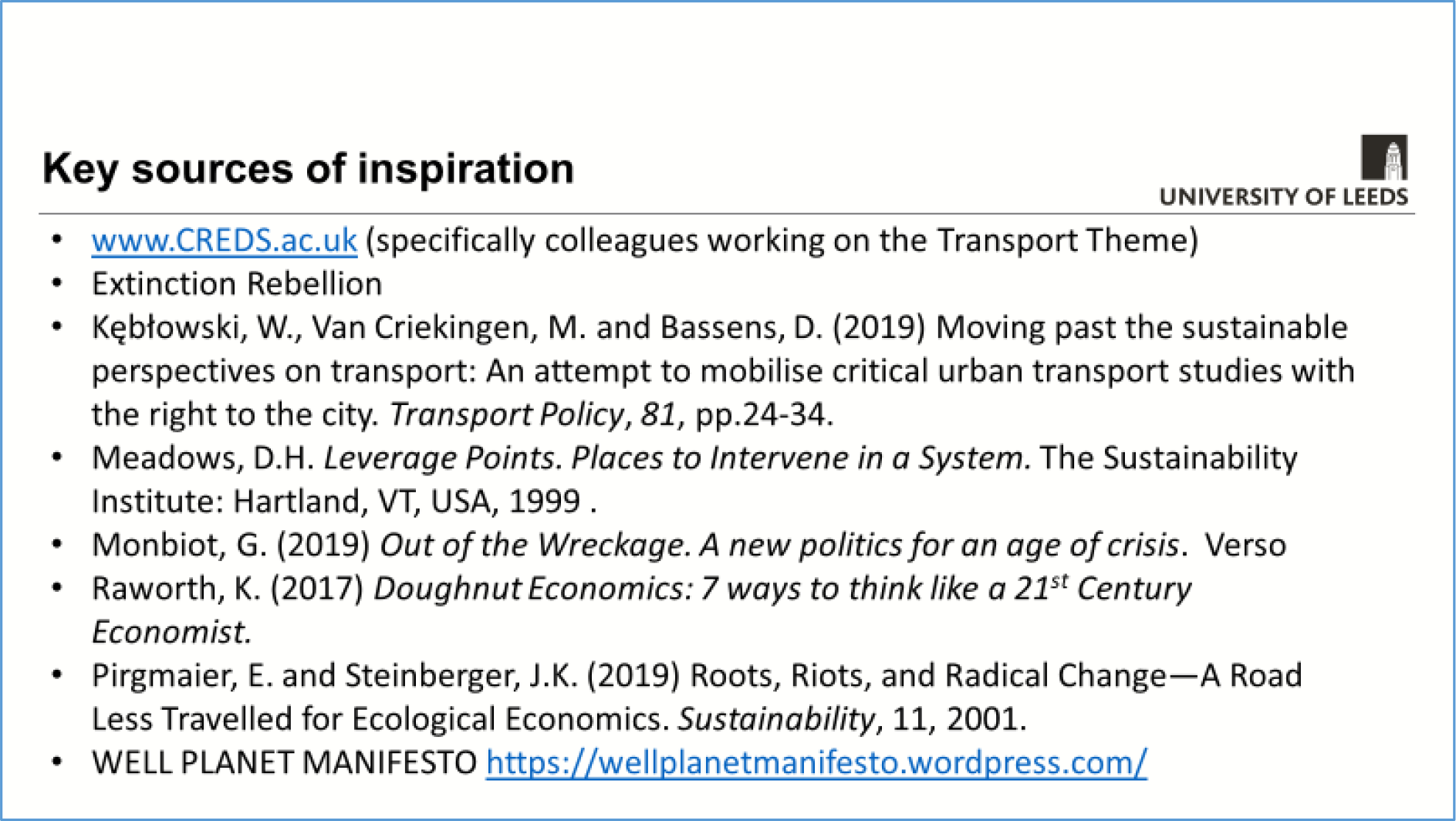
I attempted to illustrate each pledge by using examples from my own research to date and how this might be done or seen differently if these had been applied. I haven’t always succeeded with concrete examples or solutions. But, it is a start.
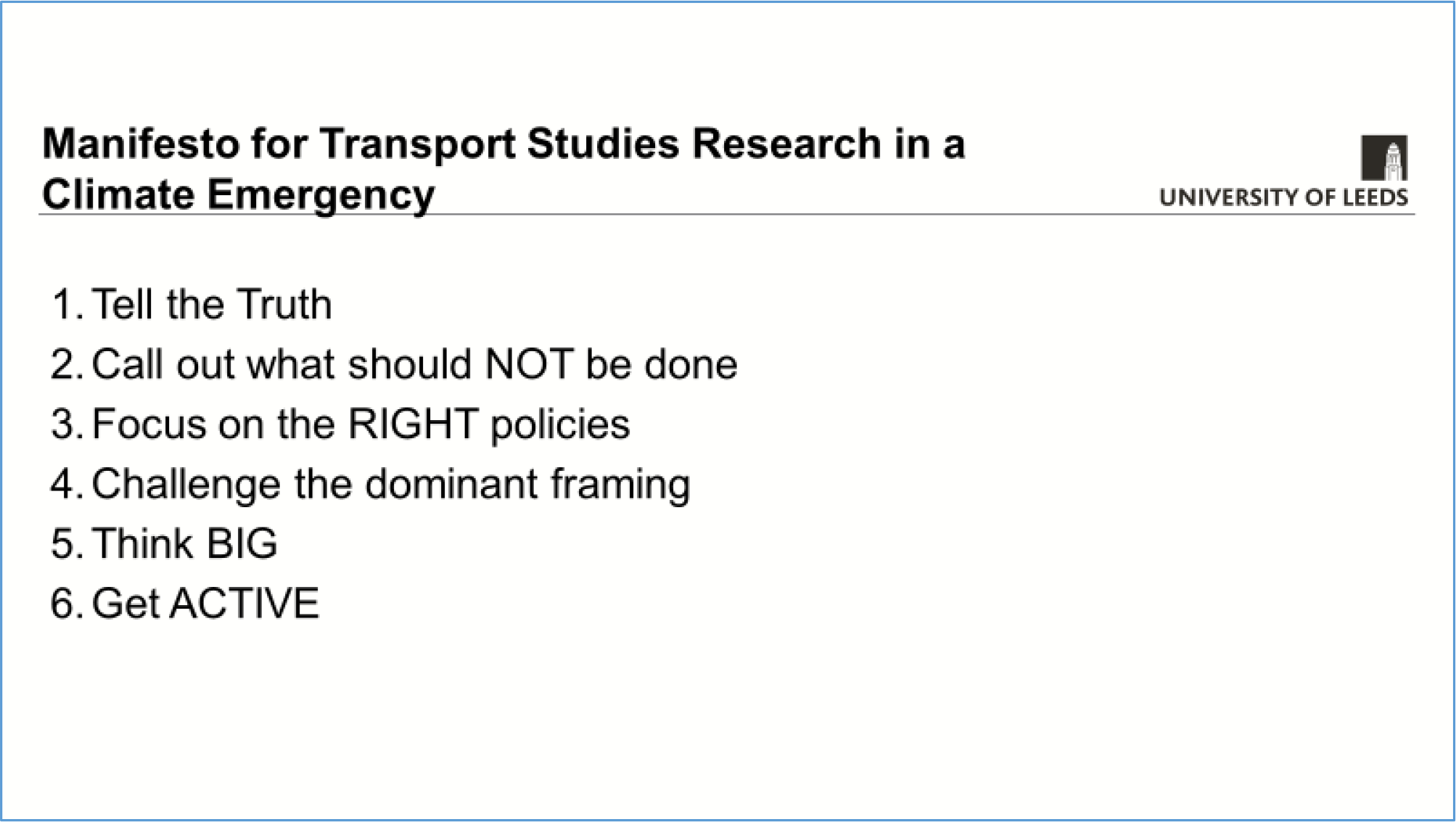
#1 Tell the TRUTH
Tell the Truth is the first of Extinction Rebellion’s demands. It should the first demand we also make of ourselves as experts. I am NOT accusing anyone here of lying or being deliberately dishonest. But I do think we can definitely perpetuate deficiencies in understanding and action by holding back and not saying how it is.
Here are some example truths, or elephants, I would like to expose:
Travel behaviour change is deliberately non-transformative
Some of you will know that the area of research I am most known for is travel behaviour change. The Transport and Energy title is just a decoy to bring in the money!! But, I can tell you I increasingly
flinch at the idea of being seen as an ‘expert’ in Travel Behaviour Change because of the fact that this agenda – in both research and policy domains – is, in effect, I would say, deliberately non transformative.
It is characterised by proposing a shift away from car dependency, embracing individual choice and lifestyles. OK, ‘sustainable mobility’ embraces a wider spectrum of environmental and social challenges than purely economic perspectives. The Smarter Choices agenda, for example, pays attention to interpersonal and collective influences and outcomes such as urban vitality and participative ways of generating transport policies.
BUT this approach has largely been used to reinforce the focus on car-based congestion and to perpetuate the political framing that Steve Melia identified with respect to the recent resurgence on road building – in this case, the notion that some shifting of behaviour will help to slow the rate at which things get worse.
When working on Smarter Choices, I was fully signed up to the idea that sustainable mobility can be achieved by ‘positive behaviour change’. But now I question the onus it places on individual responsibility and the reliance on a notion of direct cause and effect between expenditure and outcomes. Our results led to things like this being written at the local level:
“This change could be as simple as making just one journey per week by bike, or bus or walking short journeys instead of using the car.” (Darlington)
OK – our work on Smarter Choices painstakingly emphasised the need for an overall vision, that changes needed locking-in, that the likely net impact would indeed come to NOWT in the face of traffic growth trends, and that issues of scale and longevity required more understanding. But by focusing on quality of life, health impacts, individual behavioural shifts – it failed to be honest that the real impact of these measures would always remain minor without a total reorientation of social, economic and political agendas.
And now, in the face of a Climate Emergency, I have to say that such measures seem almost farcical to me. Too slow, too incremental, no sense of how to scale up and, moreover, too much focus on positive changes, and – a point I really want to emphasise, too little discussion of who loses or who maybe should lose for the greater good.
There are no more win-win solutions
So that brings me on to my second inconvenient truth – that the timetable and scale of change in a Climate Emergency means we can no longer speak of win-win solutions (if we ever could).
Much good work has been undertaken on social exclusion and increasingly on social justice approaches in transport. The language of Co-benefits brings into focus not only cost and time savings but accessibility improvements, health benefits and some sense of thriving communities, better social cohesion, and quality of life or well-being, albeit all with much room for methodological improvement of these vital areas. But the general framing of the debate between wants and needs tends to focus on the lowest consumers – the travel poor. What this has led to is a big tension between needing to allow MORE carbon intensive lifestyles to satisfy human needs at one end of the spectrum leading to the conclusion that it is too difficult to reconcile reduced CO2 with the standards of living deemed acceptable in the UK.
But what about the other end of the spectrum? ‘High-End’ or ‘extreme’ consumption often proves to be a sensitive topic and research effort mirrors this sensitivity. There are some publications, and here are a few, but there is very little on this. Yet, high impact households are responsible for a very large share of the total: with estimates of 20% of emitters producing between 60 and 80% of transport emissions.
This needs to be addressed because the universal satisfaction of human needs requires both lower and upper limits to consumption. This means the fundamental tenets of welfare economics that tell us that more = better, needs to be urgently called into question to be able to consider how to curtail consumption. Because not all consumption is created equal as neoclassical utility maximisers would have us believe. Think of it from a well-being perspective: contrast travelling to the Alps for the funeral of a close relative versus for weekend ski trip; or transporting blood products for transfusion versus transporting coca-cola.
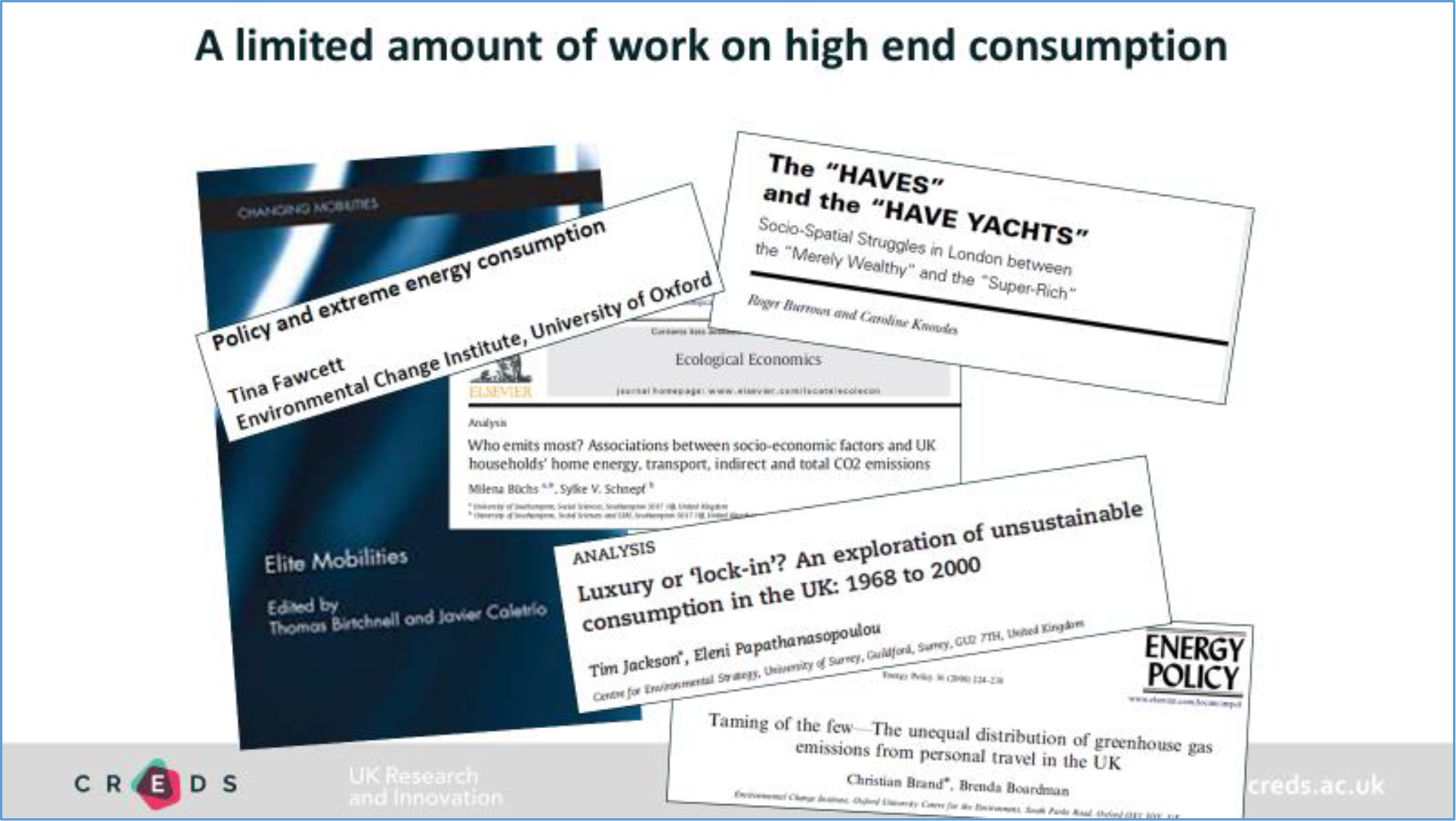
As part of the Centre for Research on Energy Demand Solutions (CREDs), we have a project called ‘Excess’ where we have begun to identify what might be clearly unacceptable in a constrained energy system. We recently ran a workshop at an international energy conference and tackled head-on some taboos around the topic. The first job was to identify categories of excess behaviours. The group settled on the typology shown on this slide:
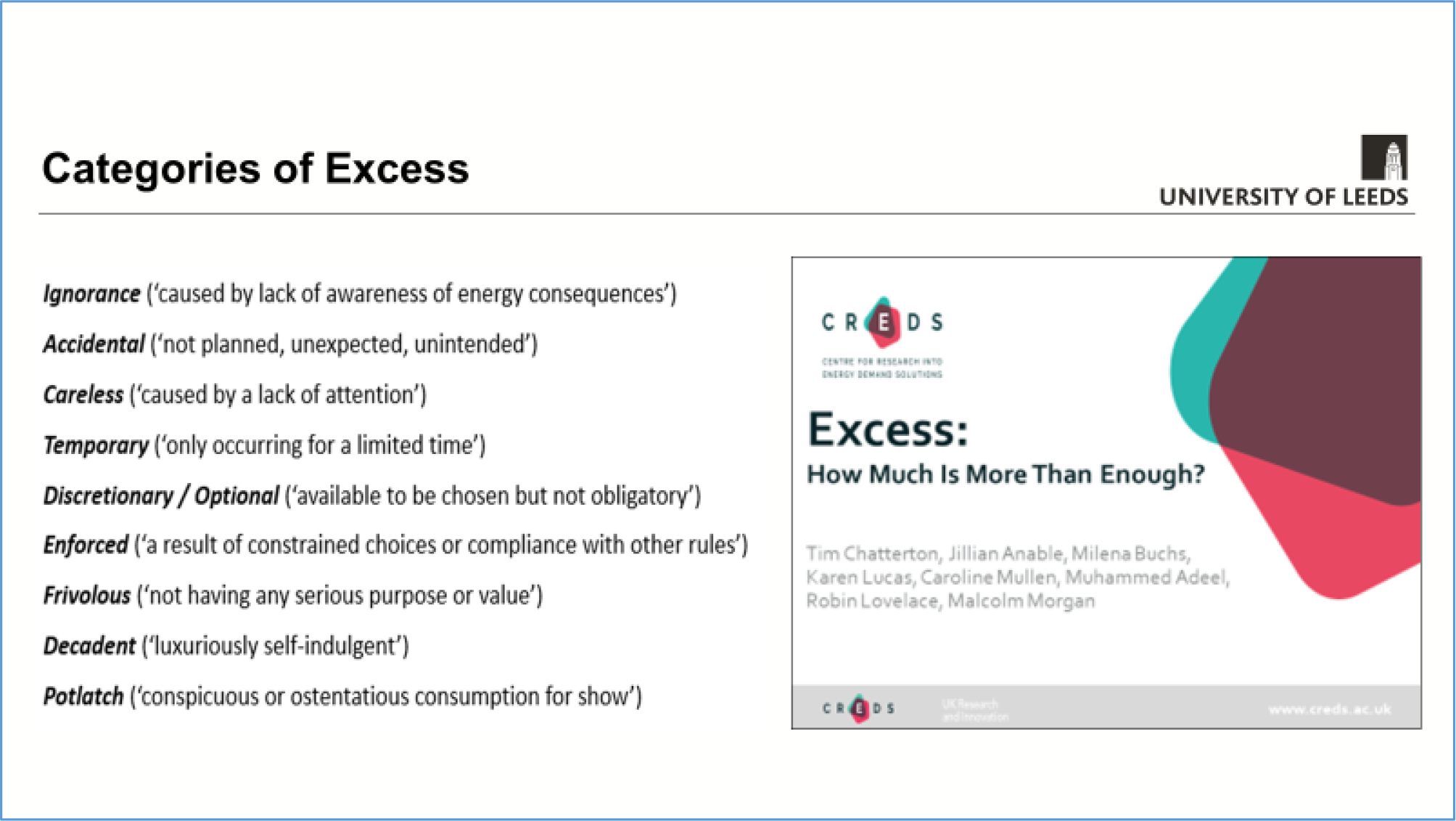
Participants then provided over 150 suggestions for ‘excessive activities’ and categorised these under nine categories. It was refreshing and rather fun, but no time to share the details here, unfortunately.
This work to flush out such transport taboos must be done. We must address the disparity in environmental footprints of the highly mobile rich and less-mobile poor, the unwillingness of the highly mobile to reduce their level of mobility, and the inefficiency of market-based or technology- based solutions to facilitate a reduction.
#2 Call out what should NOT be done
As I have said, WE HAVE TO expose the gap between current measures and what needs to happen. This is where most of my research on transport and carbon mitigation has focused so far. With many graphs that look like the image on the left, and generating headlines that look like the image on the right:
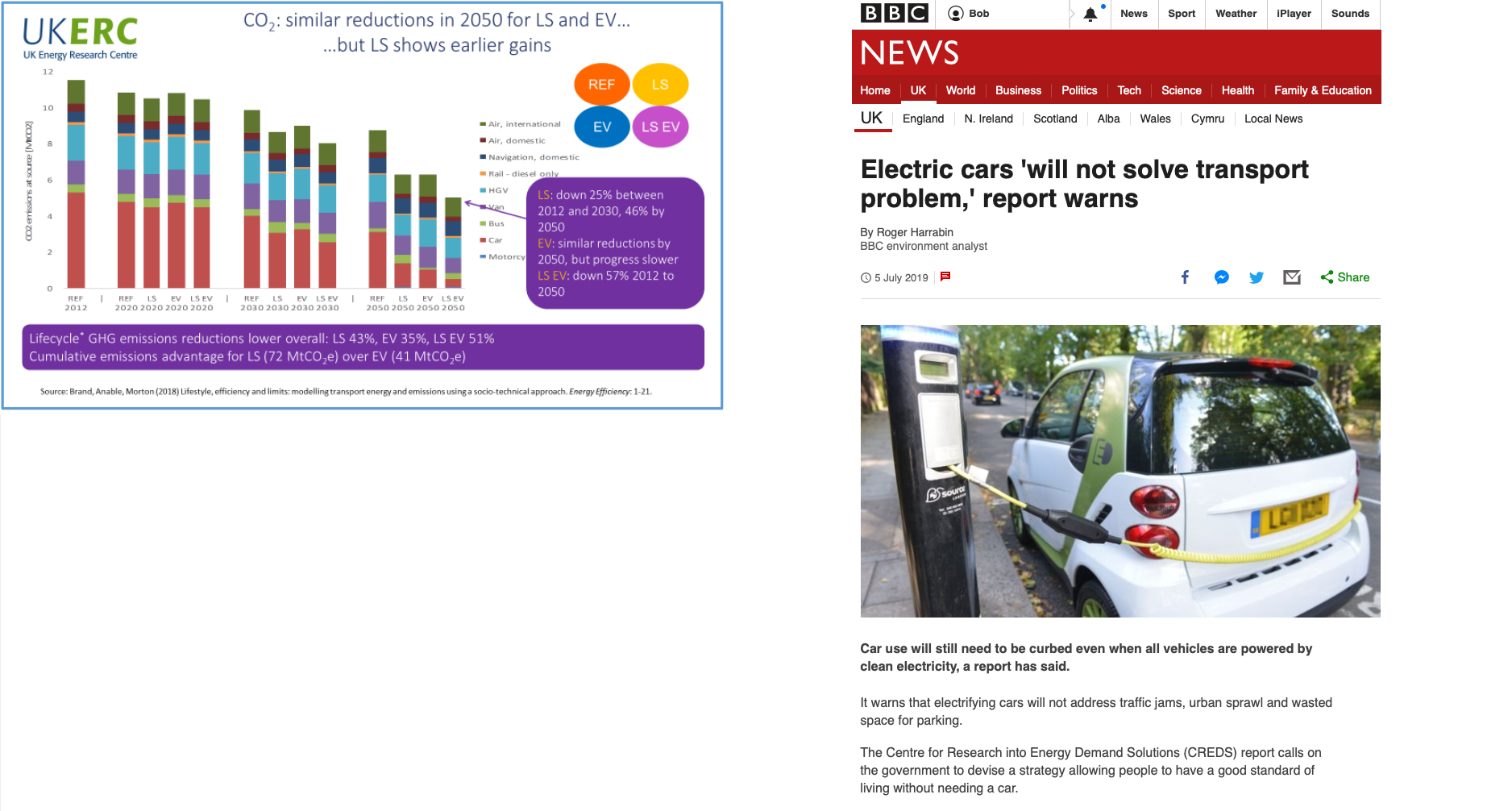
As Phil explained yesterday, the success of the New Realism derived from its systematic exposure of the discrepancy between the road building plans and the goal of congestion alleviation – i.e. providing sound reason why something should not be done. I dare to hope that our work to expose the hype around EVs will gain similar traction.
However, that does depend on the following pledge being fulfilled.
#3 Focus on the RIGHT policies
We must bring forward visionary yet realistic alternatives. And, most importantly, we must focus on the right solutions. For reasons I explain more below, it might be argued that we have locked in failure by being too effective at getting our research to inform the wrong policies i.e. using dominant appraisal approaches to evaluate single, small scale infrastructure changes without innovating about methods to inform how to scale up and where.
And certainly, I think we have to look at the ratio of research effort to carbon relevance. For example, think of how much attention we spend focusing on the commute when leisure travel not only comprises half of the distance travelled by car on average, but it is a much more universally undertaken activity across the population plus has a powerful influences on important path dependent choices such as the type of car purchased and where a person lives (for example I moved to Scotland and stayed there for 13 years for the mountaineering – thus generating a huge work related carbon footprint up and down the country). A few simple figures that we all know make this point. For example, with my colleague Giulio Mattioli (now at Dortmund), we reconfigured the NTS into a vehicle-level diary dataset and have shown that only 15% of cars have a classical 9-5 weekday pattern of usage. And, even at the busiest times on the road, only around 15% of the total vehicle stock is in use.

These are the sort of statistics that should be informing research priorities, but over and over we see how personal travel is conceptualised through the assumption of commuting being the dominant activity.
And don’t get me started on air travel! I will sum it up with a quote muttered yesterday from an anonymous member of this audience (hint, the only person to be presenting a paper on air travel here): “If this conference is anything to go by, we should speak more about aviation and less about level 5 AVs” ANON, 9 July 2019 (Leeds).
In a presentation I did for the UTSG 50th anniversary about 18 months ago, I produced the following ‘analysis’ (I use the term loosely) using the titles from all the UTSG papers during the periods represented here. The idea was to detect where the ‘people’ were in this body of research and whether they had come out of hiding over time.
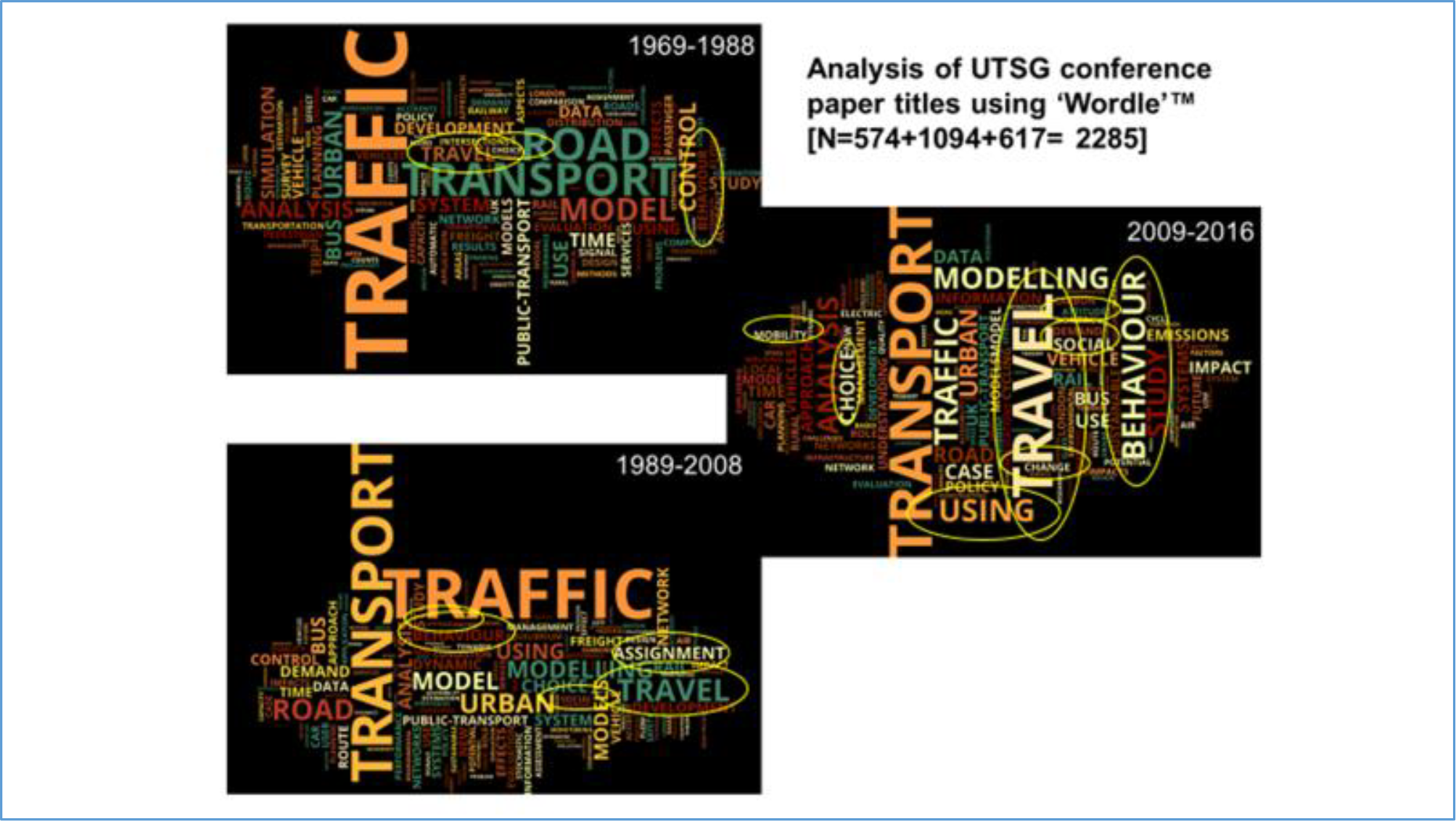
I have not had time to do this again to add papers over the last three conferences, but I guess that if I were to do it, it would look like this!
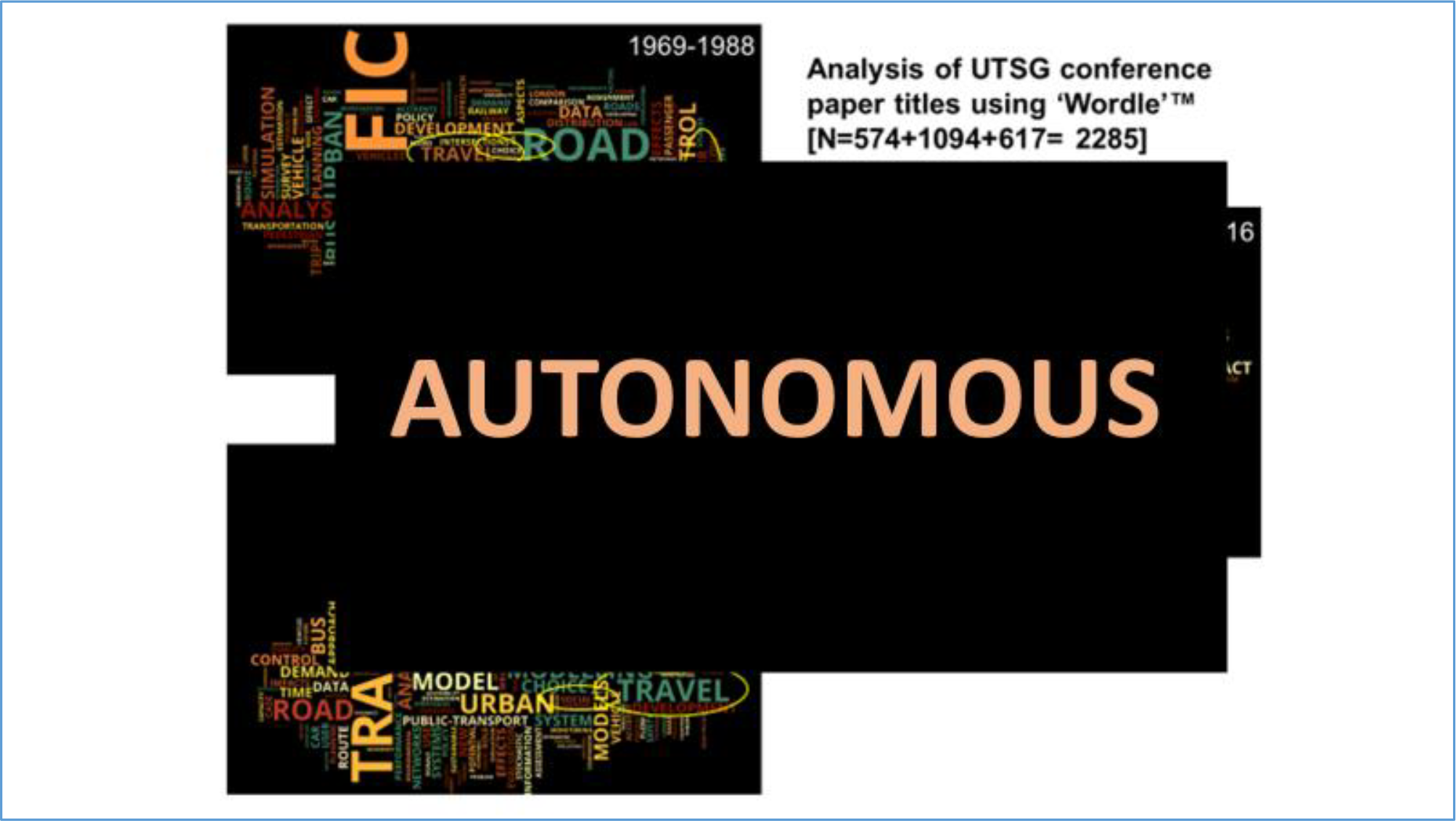
I think that is enough said on that, for now given my PTSD symptoms I alerted you to earlier! But I do suggest the morality of this skewed balance of effort must be debated in the light of the climate emergency.
#4 Challenge the dominant framing
If the previous points weren’t enough to generate some pierced lips or shuffling in seats, this one might …
It is clear we cannot protect the living planet, our sense of place and belonging on it, and our own well-being, unless we change the frame through which we see it and through which we see ourselves.” Monbiot, G. (2019), p120
We can only pursue a radical and critical agenda, and produce the knowledge we need to tell the truth, if we also challenge the dominant frame held by policy makers. For us, that is without any doubt, neoclassical engineering and microeconomic approaches. These perspectives centre upon issues of utility, efficiency, and economic growth achieved through ‘rational’ planning and decision-making, reproducing knowledge used in decision-making in the form of numerical insights from narrow and subjectively defined studies, models and policy simulation tools (Note that these points are especially informed by Kębłowski, W., Van Criekingen, M. and Bassens, D. (2019) Moving past the sustainable perspectives on transport: An attempt to mobilise critical urban transport studies with the right to the city. Transport Policy, 81, pp.24-34). Moreover, increasingly, intelligent/ smart transport systems + ‘Big Data’ is feeding into notions of ‘efficiency’ using technical, quantitative approaches.
I feel on extremely difficult ground here as I have colleagues and mentees in the room who are doing great thinking using exactly these tools. My key point is that the focus on quantification of measurable impacts can no longer be at the expense of a comprehensive social understanding of total ecological and social impacts and barriers to change. This includes the role of power (or more specifically, unequal power relations), underlying social drivers related to profit and competition, social class, geographical location, historical change, and achieving human well-being.
Where there has been debate on exactly these issues, which there has been in the likes of social CBA, the incorporation of behavioural economics such as Prospect Theory into choice modelling, and acknowledgment of wider positive effects in value of travel time savings studies – all efforts have first and foremost focused on improving the neoclassical tool and utility framework, and trip-based approaches, instead of fundamentally challenging the dominant frame altogether. It has only been patched up a bit here and there.
Most notably, the growth agenda is never scrutinised (And this by work by J.K.Steinberger and Kate Raworth, see references on earlier slide). How many of you here can say that you have even considered taking on the paradigm of perpetual economic growth in any way in your research framing? On the other hand, how much of your research has actually pandered to it, taken it as a given, contributed to appraisals and just swallowed the contradictions between cutting emissions and growth? How much of it has ended up promoting behavioural stimuli, technological innovations and market-based instruments that inevitably engender a societal lock-in?
This issue means that even the sustainable mobility paradigm has been hijacked by neoclassical engineering and microeconomic approaches with, I would say, an abject failure to engage with socioeconomic and political causes behind car-based mobility.
We have let policy become increasingly dominated by technological determinism, whereby existing demand is taken as a given rather than reshaped, and projects are conceptualised as “win-win”, ignoring the uneven social costs and benefits that the improvement of transport infrastructure may generate.
On the other hand, political economy approaches strive to understand and challenge the power relations and social and economic norms as inherent components of mobility. This allows questions to be raised about whose stake and interests are addressed by particular transport policies and practices. Although, I will admit at this point, that in a recent discussion with Phil Goodwin, he was very sceptical that there is such a thing as productive political science. Yet, after his forceful warnings yesterday of the need to get better at forecasting the political weather, I ask whether at least some of these insights are precisely what we need?
#5 Think Big
We are not the only academic area of study or discipline to be having an existential crisis (although it might only be me…). I refer you to this great quote that I think could have been written for us all in this room too.
…we claim to embrace systems thinking as a fundamental methodology, but then stop doing so when it comes to core economic categories, such as value, prices, or profits where we either adopt neoclassical reasoning or give up on economics altogether.” Pirgmaier and Steinberger (2019)
Ecological economics is also vexed by debate over its ability to embrace systems thinking. Julia Steinberger, Professor of Social Ecology & Ecological Economics here at Leeds, has been a founder of the Well Planet manifesto which calls for a focus on ‘the bigger picture’. This means prioritising research into structures, institutions and systemic change over marginal, individualistic, or market- based ‘solutions’.
In transport studies, we do have to address just how much we focus on the individual. Sustainable mobility is equated with extending one’s individual, ‘rational’ choice, for instance among different housing locations, employment opportunities, and transport modes. This perspective introduces an essentially normative and moral geography by praising particular behaviours, lifestyles, and modes (e.g. cycling, walking) while condemning others (e.g. commuting by car, flying). ‘Good’ citizens (e.g. PT users, carpoolers) are set against ‘bad’ ones. This further encourages a belief that the transition towards a ‘sustainable’ society is attainable primarily via behavioural means and could even embrace all social strata.
In summary, we are not discussing what the transport system is for, the broader implications of a comprehensive transport policy and the structural causes for mobility-related problems.
#6 Get Active
If you agree that we can take on the role of advocate, it means talking to people, over and over and over and explaining what the crisis means for each group of people you are talking to. But advocating is not the same as being an activist. Activism challenges and overtly criticises the institutions and the capitalist state itself.
The question is whether this is the only action left given the tools in our tool box and the time we have left to be successful? Indeed, why, in the midst of a crisis, were we not ALL out protesting with Extinction Rebellion over the past months? To my knowledge, Steve Melia was the only person in this room to join those protests and confront this power and I would like to personally sincerely thank him for that. It has given me much to think about.
From reading his blog, if I have interpreted his sentiments correctly, he articulates how he feels the legitimate pathways to persuasion are now redundant and must give way to what he calls ‘the art of the impossible’ in the form of a shock to the political system, and that shock, he suggests, will be civil disobedience.
I certainly cannot disagree with the idea that a shock is what it will take. And I think it is very difficult to disagree with the notion that civil disobedience would be a much better way to try to achieve this shock than waiting for catastrophe to provide it.
It follows then, that our academic research can and should no longer be purely academic. It is time to acknowledge that we have more means than most to advocate AND act by accompanying our abstract analysis that suggests the world SHOULD be on a different course, with real action of this sort.
6. Conclusion
The transport sector (and by extension those who work in it…), is on track to be held responsible for catastrophe in terms of its cumulative contribution over the decades to climate warming. How does that make you feel?
It has to mean we all face big changes and decisions in what we work on and how we work. It has to mean that our research must support radical change. It has to mean that mainstream approaches that fail to confront the social and political root causes of unsustainability and injustice but instead impede change by reproducing the status quo – need to be demoted. If we always do what we have always done we will only get what we have always got.
My great dilemma is that I have got this far in this talk and I still do not know whether to conclude by suggesting we have a window of opportunity precisely because there is so much work to do and this is now finally being acknowledged in some way by civil society, or, to suggest that it is too late and, actually, no more research is required because we have run out of time. So our only option is to adopt extreme measures to catalyse change.
I’m afraid, for now, I am going for a cop-out by suggesting that it must be a combination of the two. For sure we need to adopt extreme measures. Challenging power is undoubtedly necessary for change. Just look at the protesters in Hong Kong who understand it much better than we do.
Nevertheless, whilst I think we can no longer be only academics with good intentions, activism in all its guises can only be more effective alongside research that points out the failures and consequences of the existing approaches. We have a huge capacity and privilege as a community to contribute to tackling one of the biggest societal challenges. We can harness our problem-oriented approaches and our inherent, though often buried, aspirations towards goals of social justice, equality and well-being.
Whether we need something akin to the manifesto or pledges proposed here, is over to you.
Banner photo credit: Shutterstock



